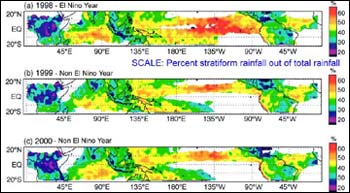
Scientists using data from a NASA satellite have found another piece in the global climate puzzle created by El Niño. El Niño events produce more of a steady rain in the middle of the Pacific Ocean. This is important because whenever there is a change in the amount and duration of rainfall over an area, such as the central Pacific, it affects weather regionally and even worldwide.
The findings appeared in a paper authored by Courtney Schumacher and Robert Houze, atmospheric scientists at t
Results from an expedition to the sea floor near the Hawaiian Islands show evidence that the deep Earth is more unsettled than geologists have long believed. A new University of Rochester study suggests that the long chain of islands and seamounts, which is deemed a “textbook” example of tectonic plate motion, was formed in part by a moving plume of magma, upsetting the prevailing theory that plumes have been unmoving fixtures in Earth’s history. The research will be published in the August 22 i

On a high hilltop terrace in Oaxaca, Mexico, a team of Field Museum archaeologists discovered a 1,500-year-old underground tomb while excavating a palace-like residence. Although it was near the end of their excavation season, they dared not leave the tomb unexplored. News of this find at El Palmillo was sure to get around, and looting would follow. As it was, workers had to guard the tomb every night until the tomb was excavated.
Images of the stone-lined interior – snapped with a digital c
It may be small, its habitat harsh, but a newly discovered single-celled microbe leads the hottest existence known to science. Its discoverers have preliminarily named the roughly micronwide speck “Strain 121” for the top temperature at which it survives: 121 degrees Celsius, or about 250 degrees Fahrenheit. Announcing Strain 121’s record-breaking ability to take the heat in the August 15 issue of the journal Science, researchers Derek Lovley and Kazem Kashefi write, “The upper
A 106,000-year-long record of nitrous oxide concentrations and a shorter record of nitrogen and oxygen isotopes show that both marine and terrestrial nitrous oxide production increased in unison and effectively by the same proportional amount during the end of the last glacial period, according to Penn State researchers.
Equal terrestrial and marine production of nitrous oxide also suggest that increased storage of carbon in the oceans was not the cause of low atmospheric carbon dioxide dur
Recent drought conditions in the North Pacific Ocean near Hawaii have caused a decrease in the strength of the carbon dioxide sink, according to a study published this week in the journal Nature. A team funded by the National Science Foundation (NSF) and led by scientists Dave Karl and Roger Lukas of the School of Ocean and Earth Science and Technology (SOEST) at the University of Hawaii used 15 years of time-series measurements to compare the precipitation, salinity and carbon dioxide (CO2) concentr